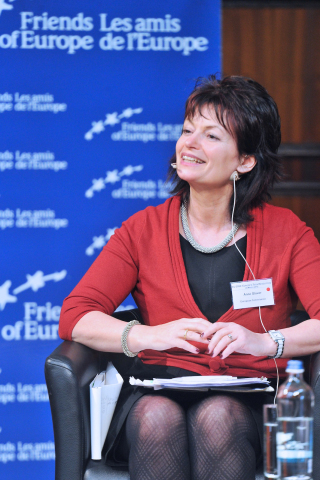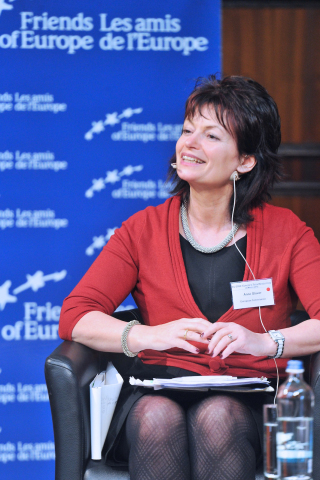
As Europe goes gray, business must tackle taboos about aging
December 5, 2014
European Science’s Great Leap Backward
December 5, 2014
Credit Courtesy Friends of Europe
Since 2012, the distinguished Scottish biologist Anne Glover has served as chief scientific adviser to the President of the European Commission. When José Manuel Barroso, who was then President, appointed her to the post, he described the job as one that should “provide independent expert advice on any aspect of science, technology and innovation.”
Last week, Jean-Claude Juncker, the man who has just succeeded Barroso, announced that he would not reappoint Glover. In fact, Juncker, the former Prime Minster of Luxembourg, abolished the position of chief scientific adviser entirely. The decision was a clear victory for Greenpeace and its hidebound allies, who had long sought Glover’s dismissal.
The complaint against Glover was simple: when providing scientific advice to the commission on a range of issues, from nanotechnology to G.M.O.s, she invoked data rather than rely on politics or whim. Last year, at a conference in Scotland, for example, she said that there was “not a single piece of scientific evidence” to support critics’ claims that food produced from G.M.O.s was less safe than food grown in any other way. “No other foodstuff has been so thoroughly investigated as G.M.,” Glover said, and described the opposition as “a form of madness.”
This kind of talk from a public scientist was too much for European activists to bear. In July, several groups, led by Greenpeace, expressed their displeasure with Glover in a letter to Juncker: “The current CSA presented one-sided, partial opinions in the debate on the use of genetically modified organisms in agriculture, repeatedly claiming that there was a scientific consensus about their safety.… We hope that you as the incoming Commission President will decide not to nominate a chief scientific adviser.” Score one for the Luddites.
When commenting on Glover’s dismissal, a spokeswoman for the European Commission said, “President Juncker believes in independent scientific advice. He has not yet decided how to institutionalize this independent scientific advice.” This sentiment would be laughable if it weren’t so dangerous. When politicians reject verifiable data and reputable research and rely instead on politics or desire, the results can be devastating. To cite a particularly painful example, Thabo Mbeki, the former President of South Africa and an AIDS denier, refused to recognize Western pharmaceutical solutions to the H.I.V. epidemic. In urging the use of home remedies like beetroot and garlic instead of anti-retroviral drugs, Mbeki hastened the deaths of hundreds of thousands of people.
Glover has been dismissed at a time when there has never been a broader scientific consensus about the safety of agricultural biotechnology or better data to support that consensus. Recently, for example, researchers at the University of Göttingen published a comprehensive analysis of studies that have assessed the impact of G.M. crops. It found that the agronomic and economic benefits, not only in the United States but in the developing world, have been significant: “On average, GM technology adoption has reduced chemical pesticide use by 37%, increased crop yields by 22%, and increased farmer profits by 68%. Yield gains and pesticide reductions are larger for insect-resistant crops than for herbicide-tolerant crops. Yield and profit gains are higher in developing countries than in developed countries.”
The World Heath Organization has repeatedly weighed in on the safety of genetically engineered products, proclaiming, “No effects on human health have been shown as a result of the consumption of G.M. foods by the general population in the countries where they have been approved.” Britain’s Journal of the Royal Society of Medicine has come to the same conclusion: “Foods derived from G.M. crops have been consumed by hundreds of millions of people across the world for more than fifteen years with no reported ill effects (or legal cases related to human health) despite many of the consumers coming from that most litigious of countries the U.S.A.” In addition to the W.H.O. and the Royal Society, scientific organizations from around the world, including the European Commission and, in the United States, the National Academy of Sciences, have strongly endorsed the safety of G.M. foods. (It should be noted that the U.S. can claim no superiority in our approach to evidence-based science, as demonstrated by the fact that nearly half of the country rejects the “theory” of evolution, and that vaccination rates in the fancier precincts of Los Angeles are comparable to those in Sudan.)
Scientific leaders were outraged by Juncker’s action. Sir Paul Nurse, a geneticist who received the 2001 Nobel Prize in Physiology or Medicine, and who is the president of the Royal Society*, said, “If the Commission has a plausible plan for ensuring that scientific evidence will be taken seriously they need to start sharing it with people soon.” Nurse was far from alone in expressing dismay. “I am appalled at the abolition of the post,” Nigel Brown, the president of the Society for General Microbiology, told the BBC. “Many of the major challenges facing Europe—climate change, food security, healthy ageing, disease control—require scientific input to policy at the very highest level. This is disastrously short-sighted.”
Ironically, last week should have been a time of pure triumph for European science: after travelling four billion miles, the European Space Agency’s Rosetta spacecraft delivered its Philae lander to the surface of a comet as it streaked by, more than three hundred million miles from Earth. It was a breathtaking achievement, and a palpable demonstration of the power of data, research, and technology. Unfortunately, one has to wonder if that mission, launched in 2004, would have been approved today. Scientific achievement has become a questionable priority in both Europe and the United States. Increasingly, we express contempt for the idea that decisions should be based on verifiable data. That’s too bad for Anne Glover. But it’s far worse for the hundreds of millions of Europeans whom the European Commission is supposed to represent.
* A previous version of this post misidentified the organization.




